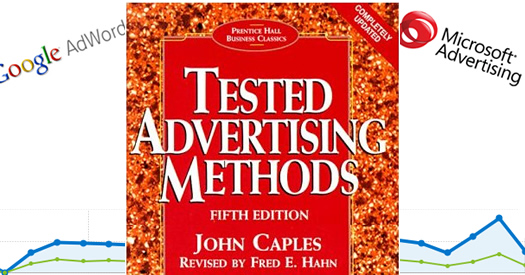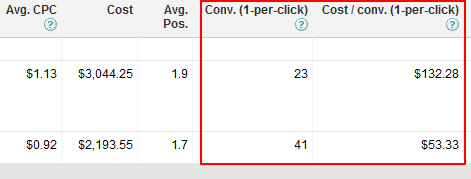
Earlier in my career I read an advertising book that had a big impact on me. The book was Tested Advertising Methods by John Caples, who is one of the most famous copywriters in advertising history. Reading his book completely changed the way I thought about ad copy. I won’t go in depth on every aspect of the book, but it holds some incredible principles for writing effective copy. And for SEM, I use those principles on a daily basis.
One incredibly important point that Caples makes in the book is that when writing ad copy, be as specific as you can, and avoid generalities. This principle resonated with me immediately, and I have consistently used this strategy during my career. Actually, I use it on a daily basis while writing ads, speaking with clients, and speaking at meetings or conferences. Yes, I even use this principle outside of writing ad copy…
It’s a simple rule that can dramatically change how your ads perform (and impact how well your core points get communicated). Using this approach will enable you to write tight copy that punches benefits, screams facts, and helps you increase the performance of your campaigns. And who doesn’t want to do that?
Here is a snippet from the book:
"Make your copy specific. Anybody who works on tested advertising will tell you how important it is to be specific in your copy. {Using specific numbers and facts} tells the reader that a strict and accurate count has been made." Caples goes on to say that, "What you say is more important than how you say it." I couldn’t agree more, and my testing has proven this time and time again.
Why Being Specific Rules and Why Using Generalities Falls Short
It makes complete sense when you break it down. There are so many generalities used in advertising that specifics seem to connect with prospective customers. They pop off the page.
Compare the following two pieces of copy and tell me which one sounds more credible:
Thousands of people enjoy our service.
Find out why 6,745 people signed up for our service in the past 60 days.
The second line of copy clearly has an advantage. Telling someone the exact number of customers that signed up for the service is credible. Adding the timeframe also brings a level of credibility. The first line of copy is so general that it loses impact.
General Copy Can Easily Be Discounted By Prospective Customers:

This is exactly what John Caples was talking about. Build credibility by being as specific as possible and you can increase your response rate. In SEM, response rate translates to people clicking through to your landing page and converting. Although, I would argue that we are focusing on the first part of the handshake (the click-through). And without the click-through, you have no shot at conversion.
The Power of Testing in SEM
What I love about SEM (and digital marketing in general) is that you can split test copy relatively easily and quickly. In SEM, you can always test new ads against your control to see which one performs best. If you want to see the impact of specific copy, set up your test and fire away. Then you can base your strategies on hard data versus opinion.
SEM Enables You To Quickly and Easily Test Ad Creative:

How Can You Be Specific in SEM Ad Copy?
In order to be specific, I recommend using facts, figures, sales numbers, percentages, sale prices, dollar amounts, etc. You need to break down the features and benefits of what you’re selling and then identify various statistics and facts that can be used in your copy. And this doesn’t just translate to numbers. You should be specific with location too. If you are close to a landmark, include that in your copy. And that’s especially the case when you are targeting mobile visitors in SEM. For example, "5 minutes from Nassau St. in Princeton" is better than "Close to Princeton."
Examples of Specific SEM Ad Copy
As many of you know, you are limited in SEM ads by character length (when running ads in Search). That said, you can still be specific with your ad copy. Let’s take a look at some examples across categories. Note, I’m not providing full SEM ads below (all lines of copy). I’ll just provide some quick examples of specific copy. It’s up to you how you craft your final ads. And again, I encourage you to test your ads to determine the best performing copy.
eCommerce: Tablet Computer for Kids
Over 1025 Games & Downloadable Apps
Just $100. Don’t spend $600 for a tablet!
B2B: Consulting Firm
74 years of combined experience.
Sign up now & access 375 reports.
Local Business: Restaurant
In business since 1943. Zagat-rated
367 Positive Reviews and Counting.
Electronics: LED HDTV
Sony 1080p LED HDTV. 60 inch screen.
On Sale Today, Only $549.
Coffee: K-Cups
100% Arabica Beans. 48 K-Cups for $32.
Free Shipping On All Orders.
Instructional Book (How-To)
218 pages of Computer Repair Training.
24,698 copies sold in 2011.
You get the picture. Although these examples aren’t lengthy, they still convey some powerful lines of ad copy. Being specific builds credibility and can get prospective customers noticing your ads, clicking through, and giving you a shot at converting them. On the flipside, if your ads are generic, bland, and lack specifics, they just might be overlooked. And if they are overlooked, your click-through rate drops, your Quality Score drops, and your CPC’s rise. And that’s all bad for SEM performance.
One Important Caveat – Be Realistic
One point John Caples makes is that your ad copy must be realistic. If you use specific ad copy, but it’s so far from reality, you can do more damage than just using general copy. For example, “25 million units sold in 48 hours!” That’s not very believable… I’m advocating being specific, but truthful. You should use real numbers, statistics, percentages, etc.
Summary – Be Specific, Forget Generalities
Put yourself in a prospective customer’s shoes and take a hard look at your ad copy. Would you jump to click through? If not, revamp your ad copy with specifics, and drop the generalities. As I explained earlier, the beautiful part about SEM is that you can easily split test ad copy. You just need to start.
In closing, I hope you found this post helpful. Now it’s time for me to analyze 47 holiday campaigns, including 769 ad groups, encompassing 328,456 keywords. How’s that for being specific? :)
GG
